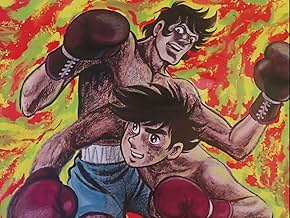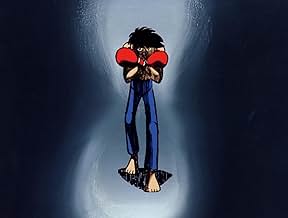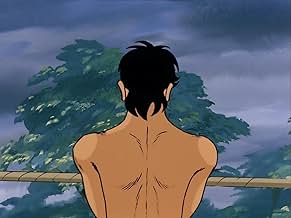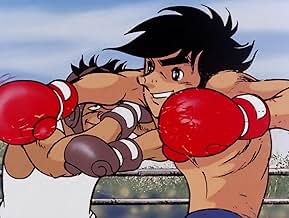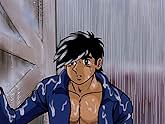Ashita no Jô
- TV Series
- 1970–1981
- 30m
Yabuki Joe is left downhearted and hopeless after a certain tragic event. In attempt to put the past behind him, Joe leaves the gym behind and begins wandering.Yabuki Joe is left downhearted and hopeless after a certain tragic event. In attempt to put the past behind him, Joe leaves the gym behind and begins wandering.Yabuki Joe is left downhearted and hopeless after a certain tragic event. In attempt to put the past behind him, Joe leaves the gym behind and begins wandering.
Browse episodes
8.72.1K
1
2
3
4
5
6
7
8
9
10
Featured reviews
Old but gold
Ashita no Joe anime is an incredibly old work, and at first I was quite skeptical about it. But after watching it the whole way through, I can only say that I am amazed. This is without any doubt one of the greatest anime in history, which influenced an entire generation of Japanese and confidently passed the test of time, because its main drawback is the art, but most people get used to it quite fast.
Ashita no Joe set the highest bar for anime storytelling quality. Such cast of characters, their in-depth exploration, development is almost impossible to find. All the characters, even the ordinary drunks, are memorable here. The main character has one of the best character developments that I've ever seen across all serialized stories.
The fact is that the vast majority of sports works are built according to one hackneyed scheme. The main character is a genius with a hidden talent in his sport. He meets a stern trainer who helps and trains the hero. Then there is a meeting with the main enemy in which the hero loses. After this, through overcoming, quarrels with the coach, loss of motivation (optional), overcoming some kind of physical injury (if any), they come to the final rival, at first loses in the fight, but miraculously turns the situation around and wins. In this regard, Joe is capable of surprising (watch the first season and you'll understand what I'm talking about). It is the plot that is the strongest side of "Ashita no Joe", and also the excellent musical accompaniment (the second theme by Rikiishi Toru and undoubtedly Midnight blues will forever be in my heart). But also the background music, music for combat and in tense moments is of the highest level (especially in the second season, the music of the first will appeal to those who love the classics of the seventies). Also excellent openings (my personal favorites are the first and fourth).
I highly recommend this anime to everyone who enjoy following well-written stories and are not prejudiced against old artstyle.
Ashita no Joe set the highest bar for anime storytelling quality. Such cast of characters, their in-depth exploration, development is almost impossible to find. All the characters, even the ordinary drunks, are memorable here. The main character has one of the best character developments that I've ever seen across all serialized stories.
The fact is that the vast majority of sports works are built according to one hackneyed scheme. The main character is a genius with a hidden talent in his sport. He meets a stern trainer who helps and trains the hero. Then there is a meeting with the main enemy in which the hero loses. After this, through overcoming, quarrels with the coach, loss of motivation (optional), overcoming some kind of physical injury (if any), they come to the final rival, at first loses in the fight, but miraculously turns the situation around and wins. In this regard, Joe is capable of surprising (watch the first season and you'll understand what I'm talking about). It is the plot that is the strongest side of "Ashita no Joe", and also the excellent musical accompaniment (the second theme by Rikiishi Toru and undoubtedly Midnight blues will forever be in my heart). But also the background music, music for combat and in tense moments is of the highest level (especially in the second season, the music of the first will appeal to those who love the classics of the seventies). Also excellent openings (my personal favorites are the first and fourth).
I highly recommend this anime to everyone who enjoy following well-written stories and are not prejudiced against old artstyle.
10Wxrnes
Masterpiece - Maybe the Greatest Anime of All Time
Honestly, I wasn't expecting much from Ashita no Joe. I thought it was just one of those old-school anime that purists overhype out of nostalgia. But I was completely blown away. It's so much more than a boxing anime - it's a deeply human story. Joe might be the most authentic character I've ever seen in anime. He's raw, flawed, and painfully real. His growth feels natural, every decision he makes, every reaction, just fits perfectly. You're not just watching him fight in the ring, you're watching him struggle through life, through pain, anger, loneliness.
What really hit me was how the series tackles themes like grief, exclusion, jealousy, and the search for meaning - all with subtlety and honesty. There's this lingering sadness throughout the story, but somehow, there's also warmth and hope in the darkest moments. It never feels forced. It's just real. Ashita no Joe isn't just a cult classic - it's a timeless masterpiece that grabs you by the gut and stays with you.
What really hit me was how the series tackles themes like grief, exclusion, jealousy, and the search for meaning - all with subtlety and honesty. There's this lingering sadness throughout the story, but somehow, there's also warmth and hope in the darkest moments. It never feels forced. It's just real. Ashita no Joe isn't just a cult classic - it's a timeless masterpiece that grabs you by the gut and stays with you.
Amazing work of writing and animation
Amazing anime. It's a grown up anime. It's harsh. But it's also touching without being kitsch. This is an anti-kitsch, loving and touching rash story. Beautifully made.
It suffers from lack of technology, of course. Even the plot won't follow modern graphics of tension and release. This is old fashioned. It's like reading a book. One of my favorite shows.
My fellow reviewer is the main reason I'm writing this review. He couldn't understand "the cartoonish design of the seven kids" and why wouldn't they grow, so I want to give him my thoughts on that. Read his review, for a detailed commentary on other aspects of the show - it's a very good review.
Here we go:
Cartoonish kids are supposed to be cute. These are the ugliest kids I've ever seem in animation. It IS unsettling. I think that's part of the plan. They are poor. It's a sick world. They are ugly kids.
And they DO change, as time passes. Specially the kid with the big teeth and the older kid, Taro, they change a lot during the 79 episodes. But they won't grow. They don't have food. Poor kids don't grow properly. They're underdeveloped. They are not normal kids. They are poor kids. I think that's the underlayment to those kids and I think it's heartbreaking.
That's some sophisticated way to deal with children in cartoon. This show is the opposite of kitsch and it's harsh, but it's not pessimistic. That's what's special about it. It's uplifting and full of hope and wisdom and lessons about overcoming problems.
It's a wonderful work of art.
Also, great music.
It suffers from lack of technology, of course. Even the plot won't follow modern graphics of tension and release. This is old fashioned. It's like reading a book. One of my favorite shows.
My fellow reviewer is the main reason I'm writing this review. He couldn't understand "the cartoonish design of the seven kids" and why wouldn't they grow, so I want to give him my thoughts on that. Read his review, for a detailed commentary on other aspects of the show - it's a very good review.
Here we go:
Cartoonish kids are supposed to be cute. These are the ugliest kids I've ever seem in animation. It IS unsettling. I think that's part of the plan. They are poor. It's a sick world. They are ugly kids.
And they DO change, as time passes. Specially the kid with the big teeth and the older kid, Taro, they change a lot during the 79 episodes. But they won't grow. They don't have food. Poor kids don't grow properly. They're underdeveloped. They are not normal kids. They are poor kids. I think that's the underlayment to those kids and I think it's heartbreaking.
That's some sophisticated way to deal with children in cartoon. This show is the opposite of kitsch and it's harsh, but it's not pessimistic. That's what's special about it. It's uplifting and full of hope and wisdom and lessons about overcoming problems.
It's a wonderful work of art.
Also, great music.
Possibly The Greatest Anime Ever Made
Ashita no joe is nothing like average shounen, in fact it's not even like average sports anime like hajime no ippo or blue lock, ashita no joe is very realistic anime that doesn't require gruesome scenes or extreme dark themes, it doesn't try to be dark or mind blowing, it's hard to explain in words but there is almost an emotional mature aspect to it, which you can just feel it by watching and reading the art itself.
The journey of joe from being arrogant to being mature is just peak fiction.
It's been more than 50 years and no fiction of media has topped ashita no joe for me. Greatest piece of fiction no doubt about it. Everything about it is beautiful, I love the midnight blues as well.
The journey of joe from being arrogant to being mature is just peak fiction.
It's been more than 50 years and no fiction of media has topped ashita no joe for me. Greatest piece of fiction no doubt about it. Everything about it is beautiful, I love the midnight blues as well.
Iconic
Ashita no Joe is a anime that aired in the 1970's and is arguably one of the founders of sports anime as a whole. But calling this series just a sports anime would not be doing it justice. While yes the story does mainly focus around Joe's boxing career, intermixed with this is fantastic drama, superb character development, and absolutely gripping suspense.
The biggest selling point for this series has to be its characters and plot. A lot of shows have tried to make the arrogant asshole lead work but to no avail, but Joe is one of those rare exceptions. Joe's massive over confidence, seeming indifference, and his arrogant attitude just seem to work.
I constantly went between cheering him on as he fought to wanting to reach into the screen and smack some sense into him. Watching Joe grow is a wild ride, but well worth it. And the supporting characters are all well fleshed out too. Every character feels like they fit into the world with real problems, relationships, and goals.
Ashita no Joe is not a story where the main character experiences nothing but victory. Joe suffers humiliating defeats and struggles with real issues. Because of this there are some parts of the story that are frustrating for the viewer as Joe enters a slump. But at no point is a episode wasted. These bitter defeats Joe suffer make victory all the more sweet and we see Joe develop as a person and a boxer through these slumps.
The issues this anime suffers from are direct results of its age. While the animation and sound is certainly great for its time period, it just cant compare with modern standards. But while it may not be as smooth as modern anime, once you get used to it you will find the rough gritty art style fits the nature of the anime perfectly.
Ashita no Joe is a absolute classic with a story as or even more epic than Rocky. If you have even a passing interest in sports anime I urge you to give this show a shot. If you can get past the dated art style you may just find a real gem.
It really is a shame how tiny attention people give it these days, although I suppose that's inevitable. Not to sound up myself, but most people tend to only watch series that started in the 00s and after. I hope that more people broaden their horizons and search for some old but gold series.
The biggest selling point for this series has to be its characters and plot. A lot of shows have tried to make the arrogant asshole lead work but to no avail, but Joe is one of those rare exceptions. Joe's massive over confidence, seeming indifference, and his arrogant attitude just seem to work.
I constantly went between cheering him on as he fought to wanting to reach into the screen and smack some sense into him. Watching Joe grow is a wild ride, but well worth it. And the supporting characters are all well fleshed out too. Every character feels like they fit into the world with real problems, relationships, and goals.
Ashita no Joe is not a story where the main character experiences nothing but victory. Joe suffers humiliating defeats and struggles with real issues. Because of this there are some parts of the story that are frustrating for the viewer as Joe enters a slump. But at no point is a episode wasted. These bitter defeats Joe suffer make victory all the more sweet and we see Joe develop as a person and a boxer through these slumps.
The issues this anime suffers from are direct results of its age. While the animation and sound is certainly great for its time period, it just cant compare with modern standards. But while it may not be as smooth as modern anime, once you get used to it you will find the rough gritty art style fits the nature of the anime perfectly.
Ashita no Joe is a absolute classic with a story as or even more epic than Rocky. If you have even a passing interest in sports anime I urge you to give this show a shot. If you can get past the dated art style you may just find a real gem.
It really is a shame how tiny attention people give it these days, although I suppose that's inevitable. Not to sound up myself, but most people tend to only watch series that started in the 00s and after. I hope that more people broaden their horizons and search for some old but gold series.
Did you know
- TriviaJoe Yabuki was ranked seventh in Mania Entertainment's "10 Most Iconic Anime Heroes", written by Thomas Zoth.
- ConnectionsReferenced in Urusei Yatsura: The Terror of Meow (1982)
- How many seasons does Ashita no Jô have?Powered by Alexa
Details
Contribute to this page
Suggest an edit or add missing content

